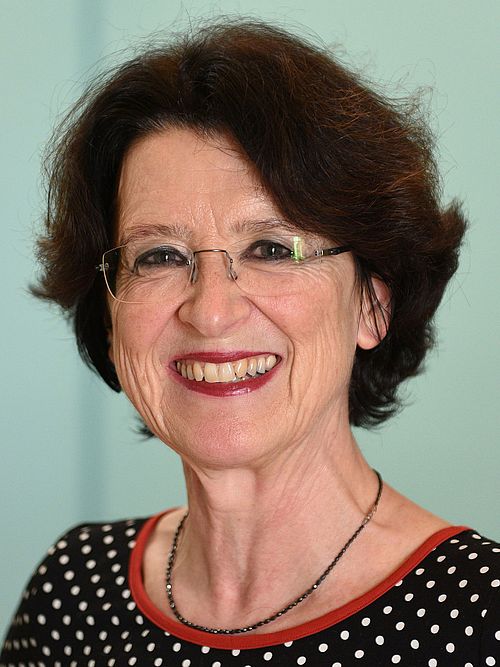
Prof. em. Dr. Madeleine Herren-Oesch
former Director of the Institute / Professor for Modern History
Institute for European Global Studies,
University of Basel
Riehenstrasse 154
CH-4058 Basel
Office 02.002
Tel: +41 (0)61 207 48 67
Twitter: @HerrenOesch
Trained in European historiography and specialized in the history of international organizations and transnational movements, I am a passionate historian with a strong interest in Global History and in curiosity-driven transdisciplinary and collaborative research and teaching. Although my fields of expertise cover 19th and 20th century history, my historiographical approach emphasizes a strong connection to the contemporary world in its multilayered, global dimensions. In my self-understanding as an academic historian, I am therefore not interested in the reconstruction or reenactment of the past. Rather my research focuses on the reasons why societies declare certain parts of the past to be their historical background and choose them as reference points for identity building. In further developing the famous concept of the invention of tradition introduced by Ranger and Hobsbawm, my preferred historiographical approach addresses this journey of historical topics for two main reasons: First, the question of who owns the past is crucial in the development of analytical tools for a non-Eurocentric global history, written and conceptualized beyond methodological nationalism. And second, the shifting of historical reference points is a phenomenon related in almost all cases to postwar periods, and therefore a crucial marker of change, reorientation and future perspectives.
My most recent research projects are related to two different historiographical scopes of action. On the one hand, they investigate the ways of doing historical research with the new tools and possibilities of digital humanities, as can be seen in the case of the League of Nations related LONSEA database. On the other, they discuss the historical impact of transgressing disciplinary borders with the aim to find an adequate education for empowering young academics to handle the challenges of the 21st century. On a conceptual level, I have spent energy and interest on developing methods and historical tools for testing the intellectual potential of transculturality as a way for gaining access to a global history of Europe beyond Eurocentrism. Within this rationale, the development of European Global Studies has paved the way for understanding historical networking processes and for connecting global, national and regional research foci in new ways. These methodological and theoretical reflections translate into a global history of Europe which exposes the traditional focus on big powers and overcomes the traditional narrative of European modernization and imperialism, which are both usually attributed to a small group of big powers at the expense of other agencies. Within this research rationale, investigations of multilayered activities include the role of international organizations, but also the lives of those moving across borders as part of networking communities.
Academic Assistants
- Lars Kury, M.A.
- Lisa-Marie Zoller-Blundell, M.A.
Doctoral Students
- Dominique Biehl, M.A.
- Matthew John Craig, MA. Bmus.
- Matthäus Feigk, M.A.
- Christian Futter, M.A.
- Julian Yves Jouini
- Lea Kasper
- Dominik Matter, M.A.
- Charlotte Roy, MA
- Patrick Sonnack, MA
- Julian Wettengel, M.A.
Student Assistant
- Sorin Marti (SNSF)
Current Research Projects
- SNSF Research Project “How to be a Global Player. The Basel Mission between Faith, Trade and Internationalism, 1910-1925”
- SNSF Research Project “Shared Colonialism“
- SNSF Research Project “A Global History of Swiss Diplomacy, 1848-1975”
- “Global Information at a Glance: Power, Law, and Commerce through the Lens of Asia Directories”
- “LONSEA: Searching the Globe through the Lenses of the League of Nations”
- “Sites of International Memory”
Further Research Projects
- “Subalten Diplomacy 1930-1960”
- “Networking the International System”
- “Lives Beyond Borders: Toward a History of Cosmopolitans and Globalization”
with Ines Prodöhl, German Historical Institute (Washington DC) - “Transnational Networks: Historical Perspectives on Transnational Networks in Environment, Agriculture, Food and Health”
Pilot Project; Coordination: Amalia Ribi, Members: Madeleine Herren-Oesch, Cornelia Knab - “Hidden Grammars of Transculturality – Migrations of Encyclopaedic Knowledge and Power”
with Barbara Mittler - “Environmental Activism”
Research project Coordination, together with Somnath Batabyal - “Global Politics on Screen. A Japanese Film on the Lytton Commission in 1932”
- Web Portal European History
- Heidelberg Studies on Transculturality
(Open Access Book Series) - Transcultural Research – Heidelberg Studies on Asia and Europe in a Global Context
with Axel Michaels and Rudolf G. Wagner - Searching the Globe through the Lenses of the League of Nations: Database (LONSEA)
- University Council of the University of Heidelberg
- Scientific Advisory Council of the Leibniz Institute for European History Mainz
- Advisory Council of the Confucius Institute at the University of Basel
- Scientific Advisory Council of the Journal Historische Zeitschrift
- International Advisory Board Journal of Genocide Research
- Scientific Advisory Council of the Journal Monde(s). Histoire, espaces, relations
- Editorial Board comparativ, Zeitschrift für Globalgeschichte und vergleichende Gesellschaftsforschung
- Commission “Documents on the History of Religion and Law of premodern Nepal, Academy of Sciences, Heidelberg
- Commission of the Diplomatic Documents of Switzerland
- Commission of Museum der Kulturen, Basel
Regarding the supervision of Master Theses in European Global Studies, I am happy to consider enquiries from students on topics relating to the global history of Europe. At present, I am particularly interested in theses researching questions within the following domains:
- global history, transcultural studies, European history in a global perspective, historiography, digital humanities
- history of international organisations and global governance, transnational social movements, history of modern diplomacy
- Switzerland in European and global perspectives, small states in international relations
- transboundary biographies, migration history, enemy aliens, expat communities, Western migration to Asia, (de)colonisation and imperialism
- history of nationalism and citizenship, civil rights and multilateralism on a global scale, history of international and transnational law
- spaces of global exchange and travel, extraterritoriality, connections and networks in historical perspective, history of capitalism
You are also encouraged to read the information on on-going research on the Global History of Europe.
